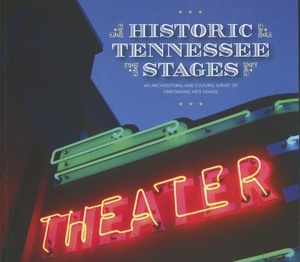

Copies of Historic Tennessee Stages will be sent to each venue included in the book, as well as public libraries across the state. The book includes the Paramount Center for the Arts in Bristol, Tenn.
NASHVILLE, TN -- The Tennessee Arts Commission announces the publication of Historic Tennessee Stages, a soft-cover book documenting Tennessee's existing historic performing arts facilities.
The recently-published book is the result of a multi-year project addressing the Commission's work in cultural tourism, and preserving the state's cultural heritage.
The architectural and cultural survey started three years ago when the agency contracted with Fairview consultant F. Lynne Bachleda, to do initial research, and survey resulting in the creation of the content. Bachleda wrote and edited the text, and was the principal photographer.
Originally conceived as a project to document historic performance venues in Tennessee of some age, cultural and architectural importance, the original search yielded buildings of note built before 1975. Ultimately this was expanded to include newer venues from across our state. A total of 47 historic venues are featured in the book.
When asked about her initial impressions about her work, Bachleda said she "was delighted to find so many beautiful theaters still intact and serving communities across Tennessee." She also commented on the importance of these theaters and performance venues to local communities. "The movement to preserve and reclaim our historic performance spaces for people to come together as a community is very strong in our state. People are determined to keep this dimension of our heritage alive."
Bachleda's research determined that important social differences, including audience compositions and roles in community life exist. Wide artistic variation was also found in terms of performance genres and styles presented in venues.
"This book documents an important part of the state's cultural history," says Hal Partlow, director of the Commission's Performing Arts Program. "There are numerous theaters and performance halls located across the state, and it is gratifying to see these facilities recognized for both their architecture and their historic importance. It is especially important to note that many of the performance venues found within the book have become sources of pride in their communities."
According to Partlow, renewed interest in and renovation of these structures has cultivated economic revitalization on town squares and downtown districts throughout the state.
Copies will be sent to each venue included in the book, as well as public libraries across the state. The Commission believes that Historic Tennessee Stages should always be viewed as a work in progress, as some sites inevitably close while others are revitalized and reopened, and new facilities are built.
"The Tennessee Arts Commission has a long and proud history of providing support for artists, organizations and facilities engaged in presenting, promoting and preserving our rich cultural legacy," says Rich Boyd, executive director of the Commission. "The publication of this book, documenting the historic stages found in every region of the state is an example of the Commission's commitment to serve the citizens of Tennessee."
For more information about Historic Tennessee Stages, contact Hal Partlow, director of the Performing Arts Program for the Commission, at 615-532-9801 or e-mail hal.partlow@tn.gov.